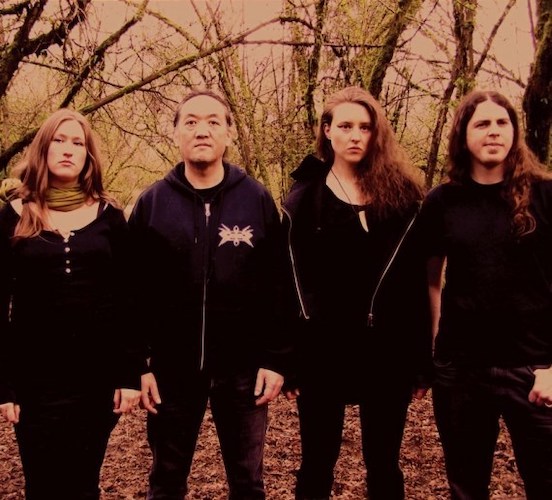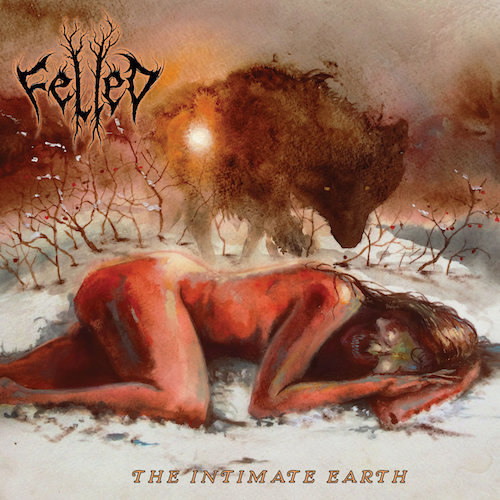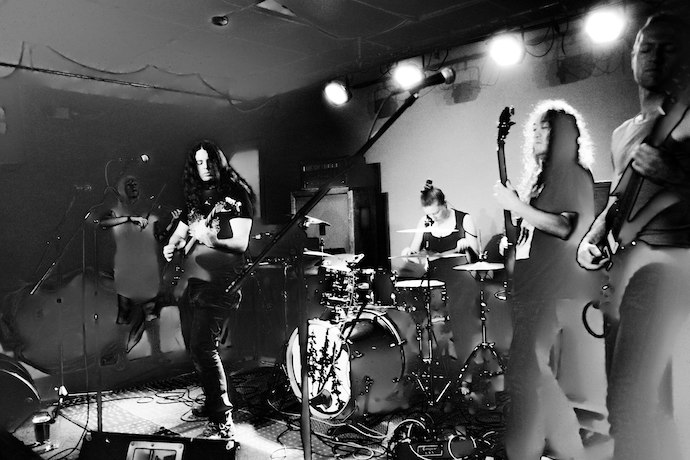
(In this new interview Comrade Aleks talked with members of the wonderfully multi-dimensional Oregonian black metal band Felled, whose debut album The Intimate Earth saw the light of day last summer via Transcending Obscurity Records, and which we reviewed here along with a song premiere.)
Transcending Obscurity Records has given a big push to a lot of great extreme metal bands, choosing from among the best of the worldwide underground. Folk / black metal band Felled from Eugene, Oregon is one such band.
Cavan Wagner (guitars, vocals) and Jenn Grunigen (drums, vocals) started as Moss of Moonlight in around 2010 but the project was renamed in 2014, and soon Isamu Sato (bass) and Brighid Wagner (violin, vocals) joined them. Since then only the 2017 demo Bonefire Grit was published until The Intimate Earth full-length album was released in July 2021. It was worth of the wait, with five tracks presenting to listeners the dramas of Nature and the anguish of its witnesses, showing the best of “Cascadian black metal”.
True to tell, I didn’t know this genre name before… well, I knew bands like Agalloch or Wolves in the Throne Room but I didn’t have a clue what “Cascadian BM” was. Thus we got in touch with Cavan Wagner to sort it out, along with other matters, but in the end other members contributed to this interview too.
******
Hi Felled! The band’s story starts in 2010 when Cavan and Jenn formed Moss of Moonlight. You had released one album, and it was a mix of black and folk to some level too. Why did you decide to change the name to Felled?
Moss of Moonlight began as a studio project. Years later, our sound darkened, and our lineup expanded. With that evolution, a new name felt appropriate.
Your music is based on black metal, and black metal was associated with danger and with malice in its early years. Nowadays the situation is different, and there are some more “friendly” subgenres, though of course “true and evil” bands still exist too. Where do you see the line between these two directions? What made you to choose the side where Felled stands?
We see black metal occupying a spectrum, rather than a binary. We write music about nature, which makes it (or the subject matter, at least) amoral — neither “friendly” nor “evil.” However, if we’re talking NSBM vs. anti-fascist black metal, we stand firmly in the anti-fascist camp, for what should be obvious reasons.
No, I was meaning rather the satanic / anti-clerical branch of black metal. It seems to be the point from which everything started. Just one of the stereotypes. Were you ever interested in bands of this kind?
When I was younger, I listened to a number of Satanic and anti-Christian bands, but I grew out of most of that years ago. There’s probably still a few I listen to. None of us share those beliefs. We’re all Pagan for the most part so it doesn’t really make sense for us to sing about other people’s religious beliefs, nor to evoke that kind of energy.
Also, do you feel that anti-fascism is something actual now as – rather – we face more global and wide-spread phenomena? Oligarchy, predatory capitalism, the colonial approach to Third World countries, the Church again… and fascism is just a part of these processes?
Considering the many protests and the outspokenness, there is certainly an anti-fascist movement at the moment. I think you can make a case that many of the facets you mentioned show evidence for fascism.

How did you choose to incorporate the violin in Felled’s canvas? Do you see it as an attribute which justifies use of the term “folk” in descriptions of your stuff? Do you actually feel your music is “black folk”?
There are elements of folk in our music, but folk is not the driving force. It’s easy for people to drop us in the “folk black metal” category (we’ve done so ourselves, even!). But in truth, there’s not much folk in our music. The presence of the violin might create that expectation for some listeners, but that’s not our intent. Cavan (Felled’s guitarist and songwriter) composes in layers, so it’s only natural for the violin to command one of those strata. And Brighid (Felled’s violinist) believes the violin can be as “metal” as any guitar. Her musical background is dynamic — although she studied classical violin in graduate school, she also studied ancient music and pulls a lot of her arrangements from late medieval /early Renaissance stringband sounds. All of those influences, not just the folk, show up in our music.
Was it difficult to record the violin? You also have the instrument in Cavan’s other band Poet, but Felled performs another kind of music.
No, it’s not difficult to record violin, but we’ve got a lot of experience in doing so. Brighid is a professional violinist who’s played many symphonies and went to graduate school for violin, so her ability to record violin for Felled and Poet is very considerable. Most of the parts are much simpler than playing some of the classical pieces she’s used to. As far as engineering, it takes some practice honing a sound that is to her liking, but it ultimately comes down to the basics of tracking — mic choice, placement, the room, et cetera.
I will say, one thing that’s tricky is the tuning. Guitar and bass tend to use equal temperament tuning and violin uses just intonation tuning. I don’t want to get too much into the theories behind these but basically the notes will sound off if you’re mixing up the two methods of tuning, e.g., a C will sound different on guitar than it will on violin.
Regarding belonging to a specific scene… would you agree that “Cascadian black metal” is a kind of separate movement with its own ideology and features? Do you feel yourself a part of it?
It depends on how you define Cascadian black metal. We’re from the Cascadian region and we play black metal, so in a literal sense, we fit the bill. Ideologically, we fit, too: we’re anti-fascist, we’re environmentalists, and nature informs the stories we tell. We know a lot of the Cascadian BM bands and play shows/festivals with them, so communally, we’re there, too. But our music doesn’t always have that classic Cascadian BM sound. You can hear it sometimes (like in parts of “Sphagnum in the Hinterlands”), but Cascadian BM and folk both are only threads in our eclectic sonic weave.
Regarding Cascadian black metal as its own movement… yes, there may be a case for it. The “genre” began in the Cascadian region with projects like Weakling and WITTR, but other bands beyond our area have been associated with it — Panopticon and Falls of Rauros, to name a few — suggesting that it is, perhaps, a movement defined more by sound and ideology than just bioregion.
There are other elements in The Intimate Earth, and I would point also to parts which are specific for doom metal. How wide are your personal musical influences?
Our members have broad and eclectic musical influences. Doom bands, such as Bell Witch and Yob, play a part, as do black metal bands like Addaura and Moonsorrow. Cavan also enjoys medieval-inspired folk like Hedningarna and Virelai. Jenn (Felled’s drummer and lyricist) listens to a lot of Icelandic bands and composers (Árstíðir, Auðn, Atli Örvarsson, et cetera), but “natural” sounds (wind, rain, the clack of sea-turned stones) probably influence her drumming the most.

It’s good to see how naturally and easily other influences are accepted by “genre-tied” bands, and it’s a win-win situation in Felled’s case. And Cavan also performs funeral doom within the Poet project. How soon do you (Cavan) plan to record a second Poet album? Emily is quite an inspiring piece.
Thanks! We’re not sure at the moment. We just wrapped up the songwriting for the new Felled album and our side project, Weoh, is almost finished recording, so there are a few of other albums currently being prioritized over Poet right now. However, there is an EP for Poet that’s mostly tracked so hopefully we’ll get around to getting that out next year.
And what about the influences regarding The Intimate Earth concept? Your lyrics are filled with metaphors and images, so it could be interpreted differently.
Yes, we like it that way. : ) But to give you a general idea, The Intimate Earth tells the story of a westward journey. It begins on the fire-harried eastern edge of the Cascadian bioregion and ends at the Pacific Ocean.
Can you give some literary references to provide a clue to this plot?
Are you wanting lyrical references? In the “Rite of Passage,” the protagonist has just come over the stormy mountains and is entering the valley west of the Cascade Range. The chorus briefly delineates this westward journey, reading:
Westerly, oceanbound
Mountain-maw wakening
Communitas of spark and spuming sea.
How long did you work on The Intimate Earth? Did you have a general vision of this album when you were composing the first tracks?
The album had been written for a couple years before we got a chance to record it, but it probably still took another six or so months to record everything and have it mixed. As previously mentioned, the vision was to create a story of a westward journey from the eastern reaches of Cascadia into the heartland. Originally the thought was to depict this journey from a fiery region like Montana into a rainy region like western Oregon — to paint a picture of these two vastly different lands and the journey between. This was conceptualized years ago, and sadly since then, even the rainy areas of Cascadia have become fiery too.
Would you approach this theme of climate change in the next Felled album? Or is it something what helps you to escape from reality?
Jenn is still in the process of writing the lyrics for the upcoming Felled album, but I’m sure we’ll include climate change in some way. With Felled, we’re not necessarily trying to escape reality. We really weren’t trying to tie climate change into The Intimate Earth. That theme defined itself over time in the sense that from the time the album was conceptualized to the time it was released, the effects of climate change had become more obvious within our region and more widespread.
You recorded the album with Stephen Parker of the blackened doom band Maestus, and he’s known for his studio work with dozens of other bands. How do you value the experience of working with him?
Yes, Stephen’s great! He engineered drums for us and is a good friend. He and his brother have a number of stellar projects, including Maestus, Paraphilia, and they were both in Pillorian. As you mentioned, he’s worked with a lot of musicians over the years, as well as with a few of the larger record labels. His engineering and music business expertise have been invaluable, and we really enjoyed our time tracking with him!
We also had the pleasure of working with Jack Shirley, who mixed/mastered The Intimate Earth. He too has worked with many notable bands (Lycus, Downfall of Gaia, Deafheaven) and was incredibly kind and easy to work with. He’s a deft hand at mixing black metal and perfectly captured the feral, enveloping sound we wanted.
The album was released by Transcending Obscurity Records (vinyl, CD, special edition)… Does this collaboration with such an active label solve most of the band’s problems?
Transcending Obscurity is a powerhouse; they’ve been key to The Intimate Earth’s success and for that, we’re endlessly grateful. It’s not just about the vinyl and special editions, though. Kunal, the label’s owner, has done a fantastic job of creating a supportive community of listeners. People trust his sonic vision; they’re always excited to see what new underground music he’s going to put out, and so are we! We’d been following TO for a while before joining the label; getting to be on the other side of things has been quite the treat.
Did you play live with Felled before lockdown? Do you have a chance to play live in the near future?
Yes, we played regularly before the lockdown — local shows, a west coast tour, festivals, et cetera. We don’t currently have any shows lined up but we’ll be looking to schedule some soon!
https://felledband.bandcamp.com/releases
https://www.facebook.com/felledband/
https://felledblackmetal.bandcamp.com/album/the-intimate-earth-folk-black-metal

Fauna started Cascadian black metal. Just to clarify. It’s no secret around these parts. Also outside of Immortal pride there’s been no legit NS scene so not sure what these anti fascists are supposed to be fighting? Decent band though been meaning to see them, Weoh is good as well although it’s almost a stereotype to have a “black metal” and a folk project at this point.